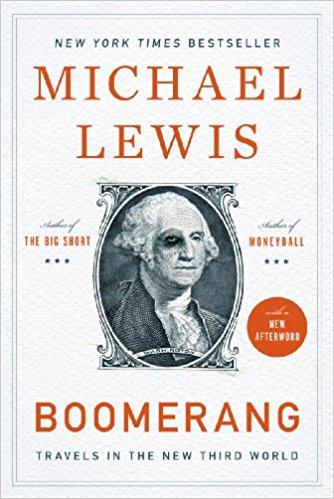Boomerang Summary
<1 min read ⌚
 Travels in the New Third World
Travels in the New Third World
If you wonder how the 2008 financial crisis began, search no more: Michael Lewis will give you the details.
And we will summarize the essence of his book on this very topic in our usual 1000 words.
Who Should Read “Boomerang”? And Why?
“Boomerang” is a book that looks back in time and explores the reasons the 2008 financial crisis began.
We recommend this gripping bestseller to anyone interested in finance, and concerned about the future. Look back at where the world was, and see for yourself how far it has come.
About Michael Lewis
 Michael Lewis is a bestselling author who has also written for The New York Times, Vanity Fair and Slate.
Michael Lewis is a bestselling author who has also written for The New York Times, Vanity Fair and Slate.
“Boomerang Summary”
Iceland
Iceland turned into an unexpected participant into the economic bubble that burst in 2008.
How did it all start?
Well, Iceland’s banks held just a couple of billion dollars in 2003, yet by 2006-2007, their assets increased reaching almost $150 billion. This sum was many times higher than the country’s GDP.
This expansion denoted “the most rapid expansion of a banking system in the history of mankind.”
When the global economic meltdown started, Iceland’s banks lost $100 billion, which could be roughly translated to $330,000 for every citizen.
The banks piled on liabilities measuring up to 850% of the nation’s GDP.
Before 2008, Iceland’s economy has taken off as the value of the krona expanded.
Icelanders made a lethal mistake by borrowing money in foreign currencies, which decreased their interest rates. However, this could only work if the krona continued rising.
And it did, for a while, but then the housing bubble popped, and the krona fell.
As a result, Icelanders’ repayments expanded, and they were facing “$500,000 houses with $1.5 million mortgages.”
The country’s reliance on imports implied more spending as well. This further harmed Iceland’s economy.
Greece
Greece had the most bizarre reaction to “the tsunami of cheap credit” that delighted world economies in the mid-2000s.
No one followed the country’s thriving credit.
Greece turned itself ” into a piñata stuffed with fantastic sums.”
Government employment, wages, bribery, and thievery – soared.
At the point when Greece received the euro, for example, the administration moved major obligations “off the books” to meet the European Union’s budget-deficit requirements.
Greece entered a catastrophe, not on account of its banks which acted like American subprime moneylenders, but because the banks had “lent roughly 30 billion euros to the…government,” which was nothing but corrupt.
Since the tax system enables widespread cheating and the government runs on bribery, Greece entered a surreal state in which no one in the country trusts anyone else.
The issue of tax collection aggravated the situation.
Fraud and tax nonpayment are a regular occurrence in Greece, where the courtrooms settle cases at a horrendously moderate pace.
Real estate turned into the best place for Greeks to shroud their assets since the nation “has no… national land registry.”
During the existence of the bubble, Greece overestimated its property values by utilizing fake reported sale prices.
Since the tax system empowers duping and the administration keeps running on bribery, Greece entered a dreamlike state in which nobody in the nation believes any other person.
Ireland
The Anglo Irish Bank was the primary guilty party in Ireland’s financial meltdown.
The government asserts the bank drained €34 billion from the Irish economy, while specialists named Ireland as far more heedless than Iceland.
The serious aftermath added up to the breakdown of the nation’s economy, with joblessness expanding to 10% and a deficiency expanding to “32% of its GDP.”
Strangely, the disaster did not prompt a change in government.
Instead, foreign experts and regulators surged in to fix the situation.
These controllers confronted a tough undertaking.
Ireland has gone from being close to the top of the rundown of the world’s wealthiest nations to being one of its poorest.
Spectators propose that the evacuation of trade barriers and the burden of insignificant corporate taxes take up a significant part of the fault.
Others argue that a particular decrease in births was a factor as well.
Financial analysts still can’t concur on every one of the causes, yet it is a fact that the Irish housing bubble bears the greatest amount of the blame for the country’s monetary burdens.
Key Lessons from “Boomerang”
1. What About Germany?
2. What About the United States of America?
3. Why does the US Stay Trapped?
What About Germany?
Germany works as the greatest creditor of the injured European nations struggling under the burden of the financial crisis. The world waits to see whether Germany will rescue its neighbors.
Germany’s understanding, on the other hand, is short, especially with Greece.
What fuels German discontent?
Well, Germany joined the eurozone primarily because it was assured that it would never need to act like the hero, saving its neighbors.
What About the United States of America?
In the fallout of the 2008 economic meltdown, market forecaster Meredith Whitney explored the amount the US owed their creditors, including retirees who expected annuities.
She “had found the pressure point in American finance: the fear that American cities would not pay back the money they had borrowed.”
Analysts raised doubt about her insight and notoriety, yet Whitney demonstrated right.
Why does the US Stay Trapped?
The state stays trapped since its laws enabled open workers’ compensations to increase so much that they bankrupted local municipalities.
The bursting of the housing bubble worsened the terrible situation even more.
Like this summary? We’d Like to invite you to download our free 12 min app, for more amazing summaries and audiobooks.
“Boomerang” Quotes
A banking system is an act of faith: It survives only for as long as people believe it will. Share on X It’s not just a coincidence that the debts of cities and states spun out of control at the same time as the debts of individual Americans. Share on X When you borrow a lot of money to create a false prosperity, you import the future into the present. Share on X Even in an era when capitalists went out of their way to destroy capitalism, the Irish bankers had set some kind of record for destruction. Share on X One of the distinctive traits about Iceland’s disaster, and Wall Street’s, is how little women had to do with it. Share on XOur Critical Review
Michael Lewis’s studies of Iceland, Greece, Ireland and Germany will shed some light on the irresponsible government behavior that led Europe to the meltdown. “Boomerang” is a great read for anyone interested in the world’s history and economics.
Emir is the Head of Marketing at 12min. In his spare time, he loves to meditate and play soccer.


 Travels in the New Third World
Travels in the New Third World 




